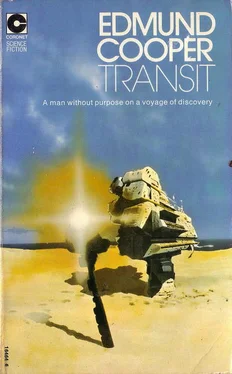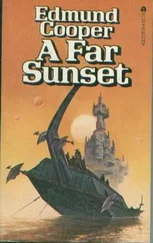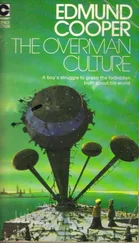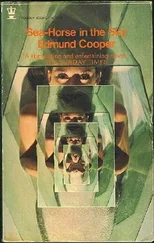Barbara made no complaint, she was patient, she was tender. At times she was even strangely maternal. And he hated himself all the more. He was perverse, and he knew that he was desperately trying to make a virtue out of perversity….
The normal daily routine at Camp Two began shortly after dawn. Early morning, they had discovered, was one of the best times of the day. Usually, there was still a touch of coolness in the air, but the promise of growing heat lay behind it. Early morning, when the air was clear and still and the sea rolled gently like a flexible mirror, was a time that seemed to taste like wine. Whoever was last on watch would be preparing breakfast, and whoever had been resting would take the canvas bucket to the stream and get the morning supply of water.
Breakfast was a time for turning over plans and projects—mostly ambitious ones that would either never be fulfilled or not for a long time. They were going to build a boat, they were going to design furniture for the camp, some day they might even build a house. Breakfast was a time when fantasy and reality blended into a heady mixture with the wine-sharp air.
Afterwards—and there was no need to hurry, because there were no trains to catch, no offices, studios or classrooms to go to, no appointments to be kept—afterwards, the task formula was thrown into gear. ‘Housework’ for Mary and Barbara: tidying the tents, airing the sleeping bags, doing any washing or mending, dumping the refuse and so on. While these domestic chores were in progress, Avery and Tom would collect more wood for the evening fire and would then set off on a hunting, fishing or fruit-collecting expedition—or, as it frequently turned out, a combined operation. So far their fishing was confined to the stream—a matter of string and bent pins, which was not terribly successful, or tickling, at which Tom developed an effective technique. The fish they caught, never more than about two and a half pounds in weight, tasted rather like inferior salmon. There were plans for deep sea fishing—but that, of course, required a boat—and something more sophisticated than bent pins.
It was Tom who first put forward the idea of making extra weapons. The ‘armoury’ with which they had been supplied consisted of two hatchets, four knives and a gun. As Tom pointed out, none of them could be expected to be effective for ever—particularly the gun; there were only thirty-four rounds of ammunition left. And it was quite possible that, in time, the hatchets and some of the knives would be lost or broken. The idea was to develop alternatives while they still had a full complement, so that any future loss would not be a catastrophe.
The first type of weapon they tried to make was a javelin. They had a go at making several on the style of those used by the golden people. But the results could hardly be regarded as an unqualified success.
Hard, straight wood was fairly easy to find. They cut it with hatchets, shaped it with knives, smoothed it with pieces of coarse rock. They toughened the ends by charring them slightly in the fire. They even tried to make blades out of rock. But somehow they could not get the knack of javelins. The balance was wrong, or the points were not tough enough, or they could not devise a satisfactory way of binding a flinty spike of rock to the shaft. After a time they abandoned the javelin project.
Then Avery had a better idea. He and Tom were getting adept at using the hatchets in various unorthodox ways. Tom had even managed to kill a fairly small but disproportionately aggressive ‘ape/bear’ by throwing the hatchet so that the blade buried itself in the unfortunate animal’s neck. Partly because of this incident, it occurred to Avery that the manufacture of throwing hatchets might be a better solution to the problem of weapons than either persevering with javelins or attempting ambitious mechanisms like cross-bows.
His design was simple. It was planned round the best kind of stone they could find in reasonable supply on the beach. This was a heavy, grey, metallic rock which was fairly plentiful and which could be worked without too much difficulty. They chipped it into roughly rectangular shape, about three inches by six inches, and about an inch thick at its widest part. The handle of the hatchet was made of a sturdy piece of hardish wood split, dried, then bound tightly together with leather thongs, so that the two-ledged hatchet head was set securely between the two halves of the handle and bound on either side. The thongs were of ‘cured’ rabbitype skin.
This type of weapon was even more successful than they had hoped. Later, Tom added a further refinement by sharpening the head end of the handle into a spike.
After considerable practice, they even developed throwing techniques that enabled them to choose between a cutting impact or a piercing impact.
They made eight such tomahawks—a task which took more than a fortnight—then they taught Mary and Barbara how to use them. After that, they began to feel a little more optimistic about the outcome of any violent encounter with the golden people. Provided it did not take place in open country, the tomahawks could be every bit as lethal as javelins or cross-bows. But their effective range was not much more than about twenty-five yards.
When the routine tasks of the morning had been accomplished, when lunch had been eaten and the heat of the day was strong enough to discourage strenuous exertion, they settled down to relax—sometimes individually, sometimes jointly.
Short siestas came in fashion. They were usually followed by a swim in the sea. Avery and Tom had explored their little bay carefully. The water was shallow— never more than five feet deep—up to about forty yards from the shore, where the sandy ledge fell away sharply and there was really deep water. In order to remind themselves of the danger, they made a couple of wooden buoys, attached by spare tent rope to heavy stones on the sea-bed. It was all right provided the swimmers kept to the shore side of the buoys.
Apart from crabs, which were painful rather than dangerous, the only vicious type of marine life that seemed to venture into the bay was a beautiful, iridescent rainbow fish that looked completely harmless—but packed a considerable voltage in the long, slender antennae that grew from its head. Avery was the first person to encounter the fish. He chased it playfully, expecting it to dart away. It didn’t. It turned and charged.
The shock almost paralysed him, but fortunately Barbara was near to help him ashore. After that, everyone gave the occasional rainbow fish that ventured into their territory plenty of room.
Since no one had swimming suits, they at first tried to improvise with underwear. It was more trouble than it was worth. Presently, they cast all inhibitions aside and began to swim naked. Presently, their bodies grew lean and muscular and brown….
Mary was an obsessional diarist. Back on Earth she had been keeping diaries for more than ten years. The thoughtful and inscrutable They who had transported them to this place had not forgotten Mary’s diaries, her most treasured possessions. Nor had They neglected to provide her with a new five-year diary.
Avery tried to read some significance into the fact that it was a five-year diary. But so was Mary’s last one— which proved nothing.
However, when she was discovered bringing her diary up to date one afternoon, Mary was promptly elected camp historian. Her entries were now no longer merely a private record, they became the official records of the group.
The first entry read: Somehow got myself tangled up in a mad sort of dream with three perfect strangers. Hope it ends soon. I’m terribly afraid. She had made this entry on the evening of the first day.
Читать дальше












